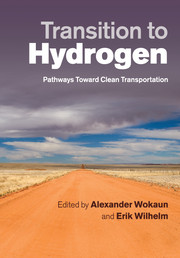Book contents
- Frontmatter
- Contents
- Contributors
- Foreword: on the transition to hydrogen
- Preface
- Executive summary
- Abbreviations
- 1 Introduction
- 2 Life cycle assessment of hydrogen production
- 3 Technical characterisation and multi-criteria analysis of light-duty vehicles
- 4 Hydrogen emissions to the atmosphere from industry and transportation
- 5 Regional fleet simulation
- 6 Long-term scenarios of the global energy and transport system
- 7 Integrated assessment of hydrogen in transportation
- Appendix A Summary of fundamental assumptions
- Appendix B Selected input assumptions, technology descriptions, and heuristics
- Appendix C Characteristics of the present and future vehicle designs
- Appendix D Survey questionnaire and aggregated responses
- Appendix E Assumptions and inputs driving fleet dynamics simulation
- References
- Index
- Plates
2 - Life cycle assessment of hydrogen production
Published online by Cambridge University Press: 05 November 2011
- Frontmatter
- Contents
- Contributors
- Foreword: on the transition to hydrogen
- Preface
- Executive summary
- Abbreviations
- 1 Introduction
- 2 Life cycle assessment of hydrogen production
- 3 Technical characterisation and multi-criteria analysis of light-duty vehicles
- 4 Hydrogen emissions to the atmosphere from industry and transportation
- 5 Regional fleet simulation
- 6 Long-term scenarios of the global energy and transport system
- 7 Integrated assessment of hydrogen in transportation
- Appendix A Summary of fundamental assumptions
- Appendix B Selected input assumptions, technology descriptions, and heuristics
- Appendix C Characteristics of the present and future vehicle designs
- Appendix D Survey questionnaire and aggregated responses
- Appendix E Assumptions and inputs driving fleet dynamics simulation
- References
- Index
- Plates
Summary
Introduction
During combustion or electrochemical conversion, the reaction of hydrogen with atmospheric oxygen produces energy and pure water. Thus, in itself, it is an environmentally benign process. However, when judging the environmental merits of any fuel or energy carrier, it is important to consider the other, often complex processes related to additional stages of its life cycle, particularly its production, transport, and storage. Only by considering the cumulative burdens on the environment and the total consumption of primary energy resources can a fair comparison be made between the available and proposed options.
LCA is a central element in the assessment of technologies and production routes, enabling a comparative evaluation of the environmental performances of different options. LCA methodology, sometimes referred to as ‘cradle-to-grave’ analysis, considers cumulative burdens stemming from the entire lifetime (construction, operation, and dismantling) of the directly and indirectly related industrial activities involved in the production of goods or the provision of services. By considering the consequences of an option according to these principles, a fair and unbiased evaluation of the merits and shortcomings can be achieved. In turn, an LCA forms a crucial aspect of a broader understanding from the perspective of sustainability, and can inform a decision-making process of the true level of either energy dependency or security that an option is likely to represent. For options which are ‘renewable’ or ‘non-fossil’ with regard to the direct conversion processes, a complete account of the background processes will determine whether a reduction of the reliance on conventional fuels will actually occur. Particularly for emerging energy systems, such as the use of hydrogen in transport, conducting such assessments at an early stage of development is important in order to identify the most promising options as well as determine environmentally significant aspects of an individual production route.
- Type
- Chapter
- Information
- Transition to HydrogenPathways Toward Clean Transportation, pp. 13 - 57Publisher: Cambridge University PressPrint publication year: 2011
- 18
- Cited by



